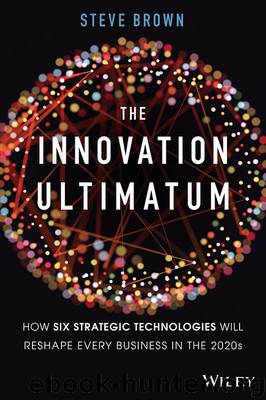The Innovation Ultimatum by Steve Brown

Author:Steve Brown
Language: eng
Format: epub
ISBN: 9781119615439
Publisher: Wiley
Published: 2019-12-26T14:00:00+00:00
By using sensors to gather data and computational resources to process and act on that data, we have elevated simple products—dog collars, food bowls, and pet toys—to deliver services, experiences, and transformations. At each level, pet owners are likely to pay more for the incremental value they receive.
Data Spirals: Create Increasing Levels of Value Using Moore's Law of Data
Engineers have kept Moore's Law going for more than half a century by designing the computer chips of tomorrow using the computer chips of today. These new chips are then used to create the next generation after that, and so on. This self-sustaining loop of increasing computing performance benefited us all. Fast hardware let us run more complex and demanding software. New software created a market for faster chips. And so, the world turned.
A new counterpart to Moore's Law has emerged: This time it's all about data. Here's how it works: A service is created that collects data in the process of delivering that service. These data are used to build a new, more sophisticated service that wasn't previously possible. That service gathers yet another set of even more sophisticated data, forming an upward spiral of value creation. At each turn of the spiral, services become more capable and more intimate, and the data sets gathered become bigger, more complex, and more valuable.
Companies like Google, Amazon, Baidu, and Facebook build data spirals all the time. Let's examine a familiar example from Google. The foundational data sets that underpin Google Maps and Google Earth are satellite images, topological data (that capture the shape and interconnection of roads), and location data. Google packages these data to create their mapping services. These “free” services gather personal data as they are used. Google logs every search you make on Google Maps and tracks your location while you're using the app. This personal data is used to deliver new, more sophisticated and more valuable services.
By analyzing your location, Google figures out where you live and work, where you buy your groceries, where your kids go to school, and gains insight into your personal interests. From your location data, Google calculates your driving speed and direction. This data is aggregated to build accurate traffic models that add a traffic service to the navigation capabilities of Google Maps and Google's Waze service.
The spiral keeps turning. Traffic data is combined with data from Google Calendar to boost the capability of Google Assistant, which offers helpful advice on when users should set out for their next appointment, given current traffic conditions. Because Google Assistant is more valuable, people use it more regularly, and for a wide variety of other tasks including home control and voice searches. The voice data gathered is used to train Google AIs. Google Home products that feature the Google Assistant voice capability include a screen that displays a screen saver for personal photos. Google encourages you to upload personal images to Google Photos so you can enjoy family photos on rotation right on your kitchen counter. Google uses those photos to train their AIs.
Download
This site does not store any files on its server. We only index and link to content provided by other sites. Please contact the content providers to delete copyright contents if any and email us, we'll remove relevant links or contents immediately.
Rich Dad Poor Dad by Robert T. Kiyosaki(6633)
Bad Blood by John Carreyrou(6622)
Principles: Life and Work by Ray Dalio(6449)
Playing to Win_ How Strategy Really Works by A.G. Lafley & Roger L. Martin(6308)
Management Strategies for the Cloud Revolution: How Cloud Computing Is Transforming Business and Why You Can't Afford to Be Left Behind by Charles Babcock(4573)
The Confidence Code by Katty Kay(4260)
Thinking in Bets by Annie Duke(4227)
American Kingpin by Nick Bilton(3887)
Delivering Happiness by Tony Hsieh(3426)
Project Animal Farm: An Accidental Journey into the Secret World of Farming and the Truth About Our Food by Sonia Faruqi(3221)
The Power of Habit by Charles Duhigg(3139)
The Tyranny of Metrics by Jerry Z. Muller(3073)
The Marketing Plan Handbook: Develop Big-Picture Marketing Plans for Pennies on the Dollar by Robert W. Bly(3063)
Brotopia by Emily Chang(3056)
Mastering Bitcoin: Programming the Open Blockchain by Andreas M. Antonopoulos(3045)
I Live in the Future & Here's How It Works by Nick Bilton(2997)
The Content Trap by Bharat Anand(2927)
Building a StoryBrand by Donald Miller(2915)
Applied Empathy by Michael Ventura(2904)
